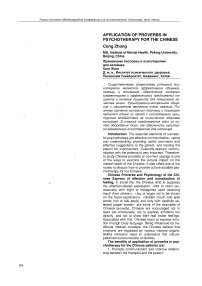Application of proverbs in psychotherapy for the Chinese
Автор: Cong Zhong
Журнал: Сибирский вестник психиатрии и наркологии @svpin
Рубрика: Тезисы докладов международной конференции по психоонкологии "Культура, мозг, тело"
Статья в выпуске: 3 (50), 2008 года.
Бесплатный доступ
Короткий адрес: https://sciup.org/142100759
IDR: 142100759
Текст статьи Application of proverbs in psychotherapy for the Chinese
Применение пословиц в психотерапии для китайцев
Конг Жонг
Д. м. н., Институт психического здоровья, Пекинский Университет, Бейджинг, Китай
Существенными элементами успешной психотерапии являются эффективное общение, помощь и понимание, обеспечение полезных комментариев и эффективных предложений пациенту и лечение пациента для повышения качества жизни. Культурально-актуальное общение с пациентом является очень важным. Поэтому изучение китайских пословиц и поговорок является одним из путей к исследованию культурного воздействия на психическое здоровье китайцев. В статье предлагается один из путей обсуждения того, как обеспечить культурно-адекватную психотерапию для китайцев.
Introduction. The essential elements of successful psychotherapy are effective communication, caring and understanding, providing useful comments and effective suggestions to the patient, and treating the patient for improvement. Culturally-relevant communication with the patients is very important. Therefore, to study Chinese proverbs or common sayings is one of the ways to examine the cultural impact on the mental health of the Chinese. It also offers one of the routes to discuss how to provide culture-suitable psychotherapy for the Chinese.
Chinese Proverbs and Psychology of the Chinese Express of affection and somatization of feeling. In social life, the Chinese tend to suppress the affection-related expression. «Not to react (excessively) with fright or indulgence upon receiving insult (from others»), «Joy or anger not to be shown on the facial expression», «Golden mouth and jade words (not to talk easily and only with carefully selected proper words)» are some of the examples of Chinese proverbs. Chinese are encouraged not to react too emotionally, not to express emotions too directly, and not to show their real inside feelings. Associated with this, Chinese learn to express emotion through body language. Being influenced by traditional medical concepts, the Chinese believe that emotions are regulated by various visceral organs. Skillful clinicians need to understand this culture-patterned communication of distress.
The benefits of application of proverbs in psychotherapy for the Chinese patients are:
-
1. Promote communication and improve relationship between the therapist and the patient.
-
2. Help the patient to identify their problems quickly by crystallized key words.
-
3. Communicate culturally shared value system for coping with problems.
Сибирский вестник психиатрии и наркологии. 2008. № 3 (50)
Final comments. Chinese people customarily use.
proverbs in their daily lives, particularly in times of.
distress, as philosophical guides to cope with their problems. Patients are familiar with the use of prov-.
erbs. Proverbs are often used in folk and professional.
counseling. The suitable use of proverbs in psycho-l therapy will promote culture-relevant communication.
Proverbs represent cultural wisdom from authority. So many proverbs exist that proper selection and use of them can help the therapist assist the patient to deal- with a wide range of problems in a culturally meaningful and effective way..


